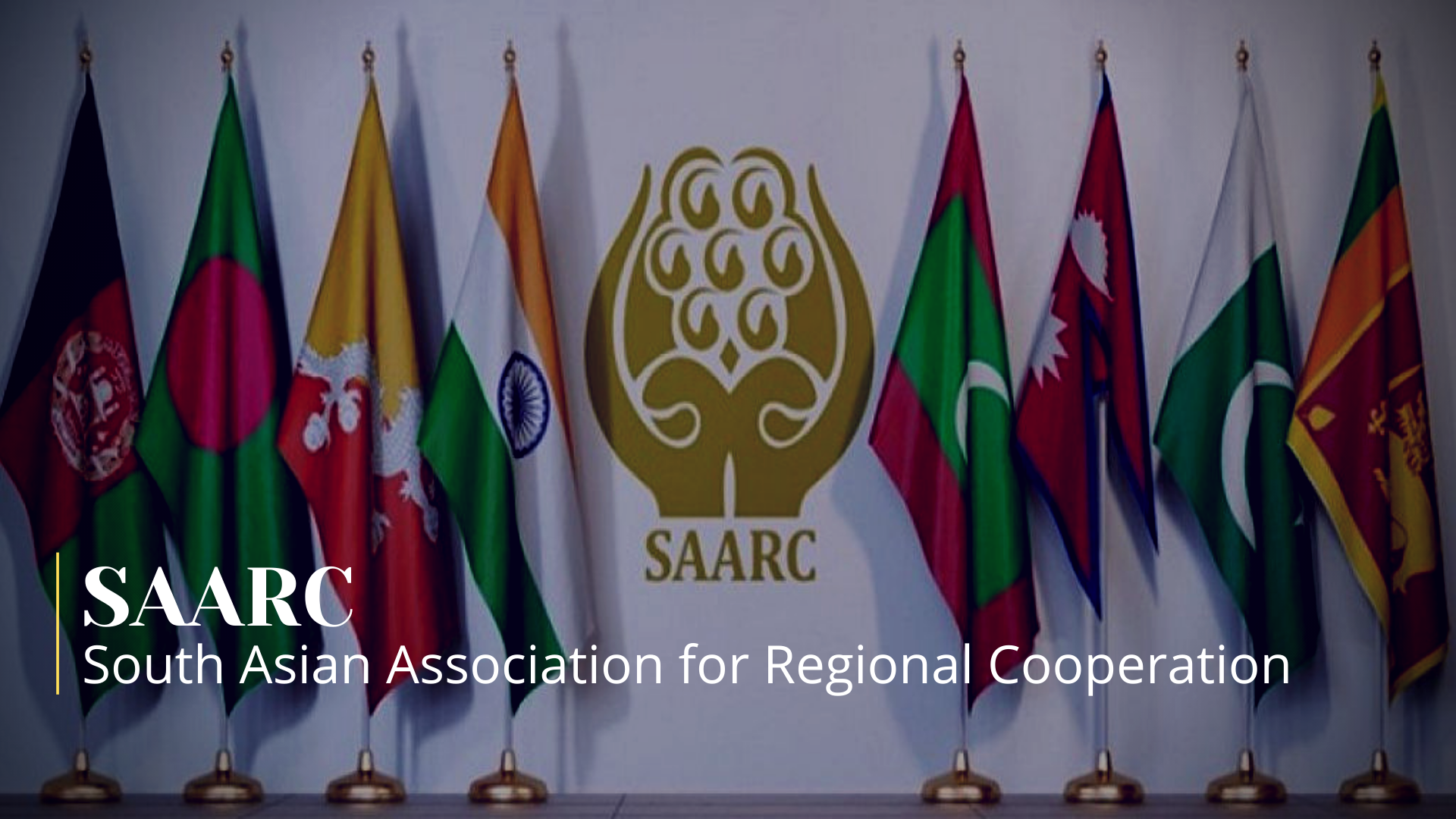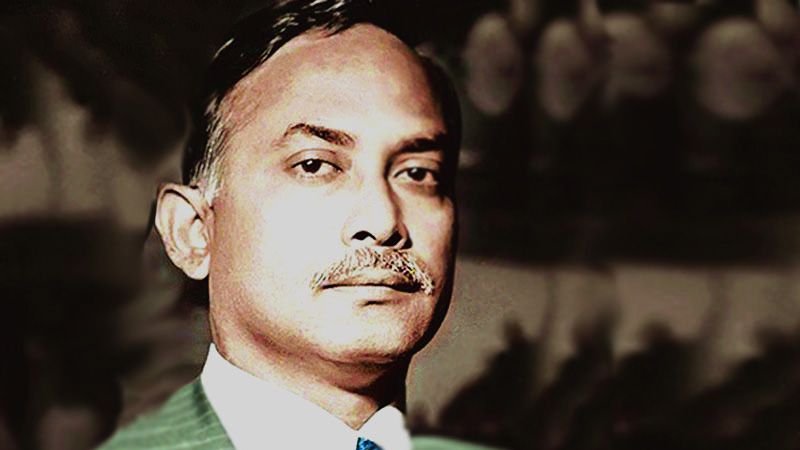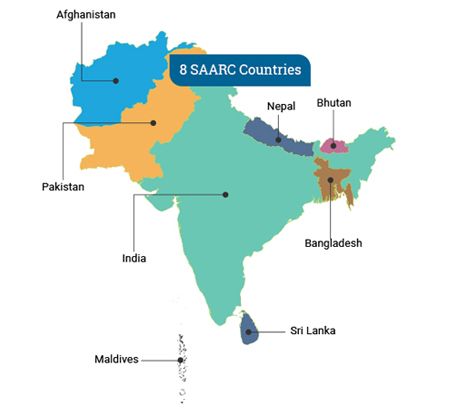The Beginnings and Activities of SAARC
SAARC(South Asian Association for Regional Cooperation) is a regional organization formed through the joint efforts of South Asian countries. The main goal of this organization was to establish free trade between the countries of South Asia.

SAARC (South Asian Association for Regional Cooperation) is a regional organization formed through the joint efforts of South Asian countries. The main goal of this organization was to establish free trade between the countries of South Asia. But then activities of this organization are now largely suspended.
Former President of Bangladesh Ziaur Rahman in 1977 thought of forming a regional cooperation organization with the countries close to Bangladesh[1]. To this end, in November 1980, the Ministry of Foreign Affairs of Bangladesh in Dhaka formulated a recommendation containing a proposal for South Asian regional cooperation. On 21 April 1981, a formal meeting of the Foreign Secretaries of the seven countries of Bangladesh, India, Pakistan, Bhutan, Sri Lanka and Maldives was held in Colombo, Sri Lanka. The Colombo meeting announced the formation of a regional cooperation body and identified areas for cooperation.

The Summit of Heads of State and Government of seven countries was held on 6 and 7 December 1985 in Dhaka. The SAARC Charter was signed on December 8, 1985. The SAARC Charter sets out eight goals. At present there are eight SAARC countries. The eighth country is Afghanistan. Afghanistan was included as the eighth country in the SAARC Summit held in Delhi in March 2006[2]. The SAARC Secretariat has been established in Kathmandu, the capital of Nepal. However, SAARC observer status has been given to a total of nine countries. The countries are China, Japan, the United States, South Korea, Iran, Mauritius, Myanmar, Australia and the European Union.

Abul Hasan of Bangladesh was appointed the first Secretary General of SAARC (December 8, 1985-1989). So far, 14 people have been appointed as Secretary General of SAARC Their list is given below[3].
| Country | Name | Duration |
|---|---|---|
| Bangladesh | Abul Hasan | January 17, 1985 - October 15, 1989 |
| India | Kant Kishore Bhargava | October 16, 1989 - December 31, 1991 |
| Maldives | Ibrahim Hussein Zaki | January 1, 1992 - December 31, 1993 |
| Nepal | Yadav Kant Silwal | January 1, 1994 - December 31, 1995 |
| Pakistan | Naeem U. Hasan | January 1, 1996 - December 31, 1998 |
| Sri Lanka | Nihal Rodrigo | January 1, 1999 - January 10, 2002 |
| Bangladesh | Q. A. M. A. Rahim | January 11, 2002 - February 26, 2005 |
| Bhutan | Chenkyab Dorji | March 1, 2005 – February 29, 2006 |
| India | Sheel Kant Sharma | March 1, 2008 - February 26, 2011 |
| Maldives | Fathimath Dhiyana Saeed | March 1, 2011 - March 11, 2012 |
| Maldives | Ahmed Saleem | March 12, 2012 - February 26, 2014 |
| Nepal | Arjun Bahadur Thapa | March 1, 2014 - 28 February, 2017 |
| Pakistan | Amjad Hussain Sial | 1 March 2017 - 29 February, 2020 |
| Sri Lanka | Esala Rowan Werekun | March 1, 2020-present |
Thirteen areas of cooperation of SAARC countries. Areas include agriculture, rural development, meteorology, telecommunications, scientific and technological cooperation, health and population activities, transportation, postal services, and industry and culture. In this context, the SAARC leaders signed the SAPTA(SAARC Preferential Trading Arrangement) Agreement on 11 April 1993. The main goal is to increase trade between member countries and reduce trade deficit. The SAPTA Agreement came into force on December 7, 1995. The SAARC countries signed the SAFTA(South Asian Free Trade Area) agreement in 2004. The SAFTA Agreement was signed on January 6, 2004[4]. The reason for this agreement is to establish free trade relations between the countries of South Asia.

There are several secretariat centers in SAARC countries for the implementation of these agreements. All these secretariats are used for different purposes.
| The name of the center | Location |
|---|---|
| (SAC) SAARC Agricultural Center | Dhaka , Bangladesh |
| (SMRC) SAARC Meteorological Research Center | Dhaka , Bangladesh |
| (STAC) SAARC Tuberculosis and HIV / AIDS Center | Kathmandu , Nepal |
| (SDC) SAARC Documentation Center | New Delhi , India |
| (SHRDC) SAARC Human Resource Development Center | Islamabad , Pakistan |
| (SCZMC) SAARC Coastal Region Management Center | Male, Maldives |
| (SIC) SAARC Information Center | Kathmandu , Nepal |
| (SEC) SAARC Energy Center | Islamabad , Pakistan |
| (SDMC) SAARC Disaster Management Center | New Delhi , India |
| (SFC) SAARC Forest Research Center | Thimphu, Bhutan |
| (SCC) SAARC Cultural Center | Colombo, Sri Lanka |
Despite having so many secretariats, it is not possible to highlight any significant work of SAARC. So far 16 SAARC summits have been held. The 18th Summit was held on 26-27 November 2014. Which was held in Kathmandu, Nepal. But 6 years have passed since then and no summit has been held. The 19th summit was scheduled to be held in Islamabad, Pakistan in 2019, but the conference was postponed[5]. But at that time the overall situation in Islamabad was not suitable for the conference and several countries including Sri Lanka and Bhutan decided not to attend the conference.
One of the principles of SAARC is that issues related to bilateral disputes cannot be raised at its meetings[6]. But in reality, these bilateral issues are hindering the work of this regional organization. There is nothing new about the bad relations between India and Pakistan. And India's monopolistic attitude is having an adverse effect on its neighbors. Perhaps for all these reasons, the activities of regional organizations like SAARC are becoming sluggish.
Reference
1. https://www.dawn.com/news/769864/saarc-a-pipedream-of-assassinated-leaders
2. https://www.dawn.com/news/240651/afghanistan-inducted-as-8th-member-14th-saarc-summit-begins
3. https://en.wikipedia.org/wiki/Secretary_General_of_the_South_Asian_Association_for_Regional_Cooperation
4. https://mea.gov.in/bilateral-documents.htm?dtl/7407/Agreement+on+South+Asian+Free+Trade+Area+SAFTA
5. https://www.business-standard.com/article/current-affairs/saarc-summit-set-to-be-postponed-116092801364_1.html
6. https://economictimes.indiatimes.com/news/politics-and-nation/saarc-should-allow-discussion-on-contentious-issues-subramanian-swamy/articleshow/37019493.cms?from=mdr

